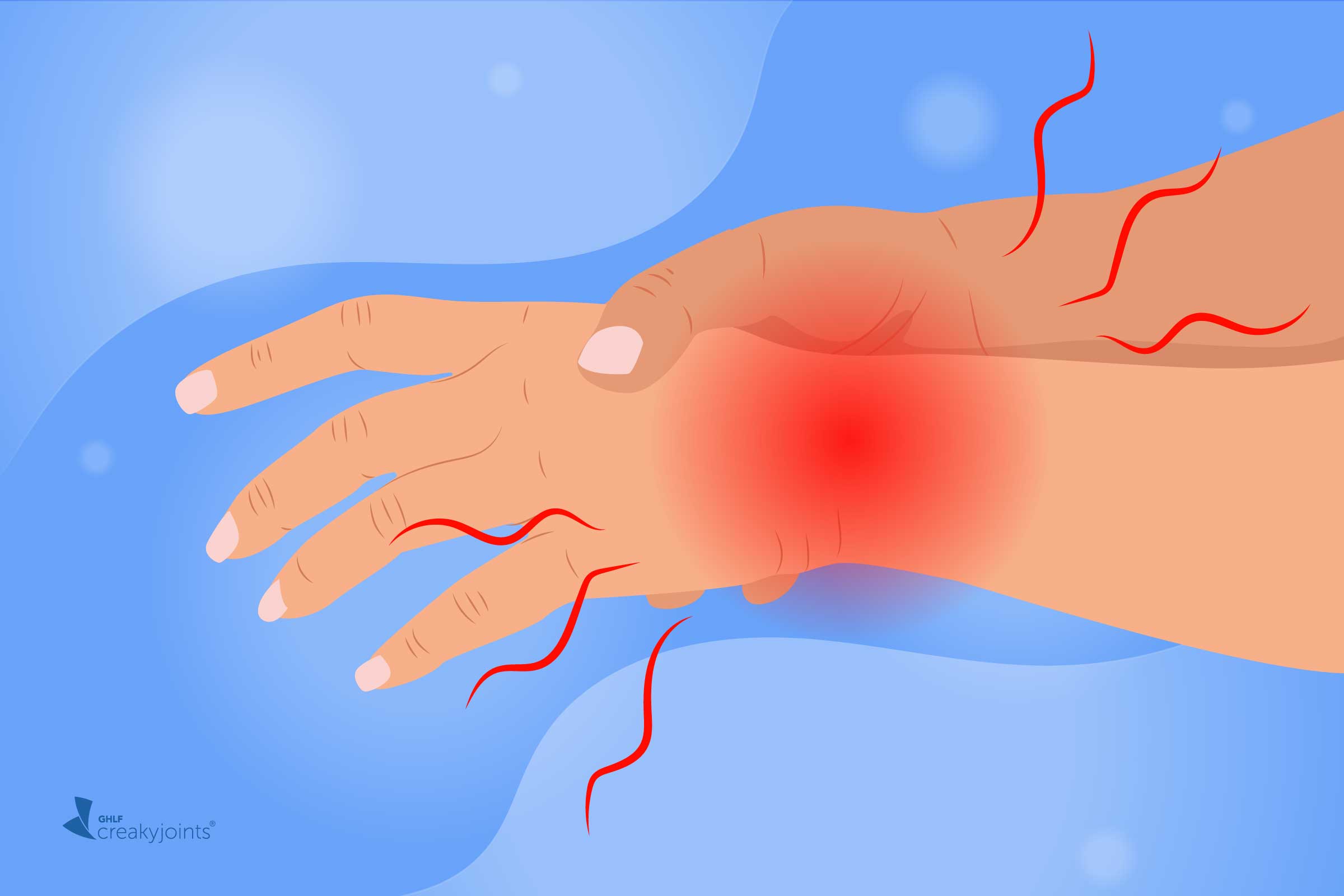

Despite what you may see on Instagram, every parent has their challenges. And if you’re a mom or dad living with arthritis, then you’re already a step ahead in the parenting game because at least you already know what your weak spots are — literally, jokes Ashley S., 36, of Everett, Washington. She has rheumatoid arthritis and is a mom of 4-year-old twins and a 9-month-old infant. Rule number one of being a parent with a chronic illness: Keep your sense of humor handy.
What else do you need? All jokes aside, being a parent while also struggling with arthritis means you need to have a great toolkit. You can’t just wing it and hope that your illness cooperates better than a tantrumming toddler. At the same time, you can’t be so rigid with your schedule that you end up pushing through pain and causing an arthritis flare-up. All parenting is about balance.
Make no mistake: Having arthritis won’t prevent you from being an amazing, loving mother or father. And it’s not just us saying this, it’s science. Mothers with arthritis are just as satisfied in their parenting role as mothers without arthritis, despite some physical difficulties caring for their children, according to a study done by the Arthritis Research Centre of Canada. The important distinction, the researchers found, was that “being” a parent is distinct from “doing” parenthood tasks. So just because you can’t always do the latter (or do them as much as you’d like), it doesn’t mean you can’t provide the essentials children need from their parents, like love, attention, teaching, and rules.
To help you find your own guilt-free balance, we talked to real parents with arthritis who have young children about what helped them cope the best.
1. Get a Handicapped Parking Pass
Forget excuses like “It’s not that bad,” “I’m only in severe pain sometimes,” “Other people need it more than I do,” or “People will stare at me.” Just get the handicapped parking pass. Parents with arthritis are exactly who these passes are made for, says Lori A., 32, of Raleigh, North Carolina, a mom of a 9-year-old and a 6-year-old. It’s hard enough getting out with arthritic joints and chronic pain; add the challenge of wrangling young children in public and you might be tempted to never leave home. The pass takes some of that pressure off by making it easier to get in and out of stores. “I got a pass when I was pregnant and it’s been a lifesaver,” says Lori, who has osteoarthritis in her spine. “Just do it.”
2. Use Motorized Scooters and Other Accommodations
When she takes her kids to the store, the zoo, an amusement park, or any other place that requires a lot of walking, Lori says she takes advantage of shuttles and scooters. “I use a cane whenever I leave the house and motorized carts at the store. When we go to amusement or water parks, we have to factor in the $50 rental fee for a motorized scooter,” she says. But having it can make the difference between a day of fun or one of misery.
3. Get This Tool to Buckle Baby Car Seats
Add car seats to the list of normal baby items that parents with arthritis struggle with. “The hospital wouldn’t let us leave with our newborn son until he was buckled safely into a regulation car seat but I couldn’t get the buckles to snap, my hands were too weak,” remembers Jeff P., 39, who has rheumatoid arthritis. “It was terrifying, honestly. Does that mean I could never be left alone with my son? How was I supposed to take him to check-ups or the park if I couldn’t even buckle his carseat?” Thankfully a nurse flagged down an occupational therapist who told the new dad about the Buckle Bopper, a tool to help making buckling car seats easier for parents with hand issues. Another similar tool is the Bucklebee.
4. Make Local Parent Friends
“The best thing I ever did when my twins were born was join the neighborhood playgroup,” Ashley says. “Those moms have saved my life so many times.” At park playdates they help lift the kids out of swings or up stairs, open snack bags, and do potty trips. On days she has bad flare-ups, a neighbor will pick the twins up and take them to playdates so Ashley can stay and rest with the baby. They’ve even brought her meals when her husband was out of town. “Other moms just get it, you don’t even have to tell them what you need. I’m so blessed with my friends,” she says.
5. Educate Your Children About Your Illness
Kids are innately curious and love to ask questions. Use these traits to teach them about your arthritis. “I’ve been very open with them growing up about my limitations and the facts of arthritis,” Lori says. “I’ve shown them what the spine looks like in a human body book, explained how joints work — or don’t, in my case — and my general prognosis.” Often, having knowledge and understanding they can ask questions will take away a lot of fear that kids may have when they see you in pain.
6. Don’t Hide Your Pain
Protecting your children from hurt or pain is one of the most natural parenting instincts, but when it comes to your arthritis, it can actually be better for your kids if you let them see your pain and struggles, says Angie K., 50, of Draper, Utah, a mom of 8 kids between age 7 to adult. “My biggest tip is lots of communication. I’ve learned that my kids need to know if their mom hurts,” she says. Letting them in on the process prevents them from feeling helpless and scared. “I don’t think parents should hide their struggles. Kids like to love on and help their parents.”
7. Involve Your Kids as Part of Your Care
“My kids can tell when I’m in pain and love being able to help me. They have such big hearts,” says Angie, who has osteoarthritis. “My kids will do things like heat up my hot packs or give me a hand massage,” she says. Other ways they can help in your care depends on the age of the child but could include bringing you a drink or snack, arranging your cushions on a chair, setting the alarm to remind you to take your medication, or just giving you lots of snuggles and kisses.
8. Let the Kids Do the Small, Daily Things That Are Difficult for You
Parents (understandably!) want to do everything for their kids. But as early as toddlerhood children can start taking over small, basic functions. “My kids will open bags, turn doorknobs, tie shoes, that kind of thing,” Angie says. “Most of the time I don’t even have to ask them, they just know that those things are hard for me with my hands.” Not only does it make them feel helpful but it teaches them vital skills like hand coordination and helping others.
9. Assign Age-Appropriate Chores
Children are capable of doing much more than we often think they can — and they love being able to help out. “A lot of the daily house responsibilities fall to the kids, like letting the dog out, taking out garbage, emptying the dishwasher, or starting a load of laundry,” Lori says. Though she does have some mixed feelings about giving them so much responsibility. “I have a lot of guilt about what ‘should be’ or what they ‘deserve’ but this is our reality and they’re growing up to be really strong, smart people.”
10. Get an Instant Pot
Young children at home require three meals a day plus near-constant snacks — all of which adds up to a lot of time cooking and cleaning in the kitchen. One way to simplify the process is to use appliances like a slow cooker, an Instant Pot (a pressure cooker), and a sous vide, Lori says. On good arthritis days you can make and freeze meals that on bad days can simply be dropped into the Instant Pot. Here are more tips to make cooking with arthritis easier.
11. Have a Simple Recipes and a Stack of Takeout Menus Handy
“On my good days I stick to simple meals like a marinated meat in the sous vide, frozen microwave veggies, and then maybe some biscuits from a can,” Lori says. “Bad days are pasta with butter or take-out.” Thankfully most young kids are fine with meal repetition (in fact they often prefer it!) so keep simple staples like chicken tenders, cheese sticks, crackers, and berries on hand.
12. Get Your Kid Used to Cold Food
“This is probably going to sound heartless but one thing I learned early on was to not worry about heating stuff up,” Jeff says. All the twisting and opening involved in changing containers was painful to his wrists. The hand strength he needed to open the microwave door felt impossible some days. He coped by teaching his son to enjoy cold food. “Room temperature formula or cold chicken nuggets are perfectly safe and he never learned that they’re ‘supposed’ to be warm since he’s always had them cold,” he says. “Obviously if something is uncooked then you need to heat it up, but a lot of stuff we think has to be hot… doesn’t.”
13. Get Groceries and Diapers Delivered
“Grocery delivery is a godsend. I order online every week and it’s delivered straight to my door,” Ashley says. She also takes advantage of Amazon’s subscription service for things she buys on a regular basis like diapers, wipes, baby lotion, and her twins’ favorite bath bubbles. “It’s worth the fee to never have to worry about running out of formula or having to do an emergency diaper run on a bad day.”
14. Embrace Being a Germaphobe
“I take biologics and a lot of people don’t realize that this makes me really vulnerable to getting sick because they lower my immune system,” says psoriatic arthritis patient Jennifer D., 28, of Washington D.C., mom of a 3-year-old. “You know who are germ factories? Kids!” To deal with this, she says she talks to her daughter frequently about washing her hands and telling her right away if she feels sick.
She also shares this information with her daughter’s preschool teacher and the parents of her close friends so they know to take precautions as well. “They understand that this is why I don’t volunteer at the school or host playdates.”
15. Buy a Grabber
“My toddler’s favorite game is ‘fetch,’ meaning he throws stuff and I have to pick it up and give it back to him,” says Steve P., 47, who has osteoarthritis in his knees. He is a father of four kids, aged 14, 11, 6, and 2. “Unfortunately, all the bending down was killing me!” Then his wife got him a set of grabber tools for Christmas, which saves him from constantly having to kneel down. “Plus, I’ll be able to use these when I’m elderly; it’s the gift that keeps on giving,” he jokes.
16. Play on Your Bed
Getting down on the floor to play with her preschooler is usually a no-go thanks to painful knees and back but Jennifer says her daughter is more than happy to bring her toys up on the bed. “We actually keep a box of her toys in my bedroom and she’ll just drag whatever up on my bed by me,” she says. “I think I actually play with her more on days I have bad flare-ups because I am just lying there and talking with her, as opposed to other days when I’m so busy and rushing around to get all my stuff done. We’ve had some really fun moments together on my bed.”
17. Bathe the Kids Whenever You Have Help
Parenting truth: Other than keeping the kiddos clean and safe, there aren’t any rules about bath time. Sitting or kneeling next to a tub, opening and squeezing bottles, scrubbing little heads, and lifting kids in and out of the tub are all tasks that can be difficult or impossible for parents with arthritis. So wait until your partner or another person can be there to help you, Lori says. And if that means the kids get bathed at two in the afternoon or they only stay in the bath for three minutes, it’s totally fine.
18. ‘Plan’ Spontaneous Trips
“I put off scheduling trips to the library, park, and museums because I can’t know ahead of time how much I can move each day without serious regrets later,” Lori says. So instead of making plans set in stone, have a list of excursions you can easily do at the spur of the moment so if you wake up and it’s a good day you’re ready to roll.
19. Get a Bucket of Random Craft Supplies
A sewing kit given as a birthday gift to Ashley’s twins is still one of her worst parenting moments. “I have sewing PTSD from that thing,” she jokes, recalling how difficult it was to use, how much pain she was in, and how disappointed her kids were that they couldn’t play with it.
“They do love crafts though so instead of kits that have to be done a certain way, I bought them a ‘craft bucket’ from Michaels that is huge and full of stuff like googly eyes, colored paper, feathers, stickers, and popsicle sticks. I hand them glue and let them go crazy.”
She supervises the crafts but doesn’t feel pressured to do them with the girls since there isn’t a specific end goal they have to look like. “I just make sure to be really appreciative of what they do and cheer them on, they don’t even care that I’m not doing it with them,” she adds.
20. Rewrite the Wrestling Rules
Wrestling with his dad is one of Steve’s favorite childhood memories, so he was devastated when he realized that wrestling with his own kids wasn’t in the cards. But instead of giving up on physical play he decided to just make it a different game. “We call it ‘mountain’,” he says. “Basically I lie on the floor and the kids climb all over me. When they try to crawl away, I’ll pull them back and tickle them.” Oh, but that’s not the end of the game! “When the kids have had enough, they have to help the ‘mountain’ get back up by helping me stand. It takes all of them to pull me to my feet but they think it’s hilarious,” he adds.
21. Arrange Playdates at Other People’s Homes or Public Places
Playdates are a kid staple, both for your sanity and theirs, but these high-energy gatherings can feel exhausting even if you don’t have arthritis. “I don’t really let the kids have friends over because I’m never caught up on having the house presentable,” Lori says. But that doesn’t mean they have to miss out on playtime with friends. Meeting at other people’s houses or a park is one option. Or head to a kid-friendly indoor place. “This is why McDonald’s playlands were invented,” Ashley adds.
22. Take Care of Yourself
Taking care of you is also taking care of your children. So try to avoid not getting your sleep, skipping doctor’s appointments, or skimping on medication, even if you feel like you should make these sacrifices for your child. “I am grateful that with being on proper treatment for my conditions, I can take care of my son well enough,” says Christina, 32, of Michigan, ankylosing spondylitis patient and mom of a 5-year-old. It’s like the old oxygen mask on an airplane analogy — you won’t be able to take care of your children if you’re not taking care of yourself first.
23. Learn to Roll with Change
Being brittle and having small kids isn’t a good combination for any parent, but when you have something as unpredictable as arthritis, it’s even more important to learn to go with the flow, Christina says. “We play a lot of days by ear,” she says. “On days when I am not doing too great my husband will get him up in the morning to get him ready for school and dinner will be something really simple.” The point is to do whatever it takes to make it work instead of stressing about sticking to a particular schedule or plan.
24. Focus on the Good Things Your Kids Are Learning
At the end of the day, it can be all too easy to get caught up in what your children are missing out on because of your disease. (Waterparks? What are those?) But don’t overlook the important lessons your illness is teaching them.
“My kids are some of the kindest and most empathetic I know (except sometimes to each other!). My son can see the pain on my face and will take things out of my hands and remind me to sit. My daughter will remind me to take my medicine or offer an ice pack if I mention I hurt,” Lori says. “Either of them will run to an unfamiliar kid who gets hurt in the playground and see what they can do to help.”





